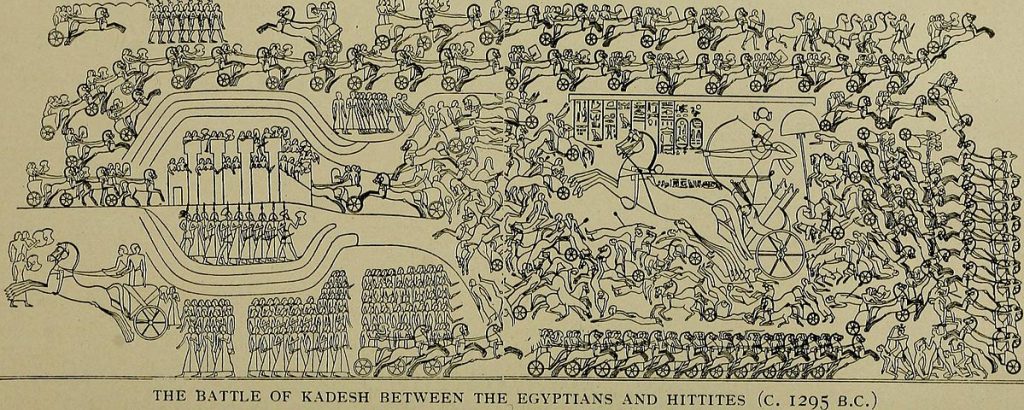The once calm and silent Egyptian landscape became flooded with the sounds of hooves crackling and wheels turning as the Egyptian imperial army approached the land known as Kadesh. The land was located along the Orontes River just upstream from Lake Homs, located in modern day Syria. The Egyptian soldiers stood dormant, gazing at land that once belonged to their king, filled with determination, and longing for revenge against their enemy. Awaiting the order to attack, they readied themselves for battle. This was the prelude to the historic clash known as the Battle of Kadesh.
The battle involved the Egyptians and the Hittites, and it was over land in Syria that the Hittites had recently taken from the Egyptians. Both sides armed themselves with bronze weaponry and horse-drawn chariots equally equipped for a long and taxing battle. The siege by the Egyptians on Kadesh is known to have lasted three months.1 This battle involved between five to six thousand chariots, the largest such engagement in military history. The Hittites were known to be highly skilled in chariot-based combat due to the help of a horse trainer known as Kikkuli. Kikkuli’s teachings helped the horses to increase both endurance and stamina. His teachings were so well regarded that royalty in neighboring Indo-European civilizations adopted his teachings for their own.2 This advanced knowledge and practice that was available to the Hittites already put them at an advantage when facing the Egyptians on chariots. The Egyptians, however, had certain advantages that the Hittites lacked. The Egyptian army, under the command of Ramses II, contained 35,000 men, while the Hittite army, headed by Muwutallis II, only had 27,000 men. Despite their differences, both sides seemed able to face the opposing army with confidence.

Early in the battle the Hittites gained the advantage by having two of their men pose as Egyptian commanders. They “informed” Ramses of the location of the Hittite camp. Ramses then, without thinking, moved his army to the location of the camp. When he arrived, he realized it had been a trap. The Hittites in fact were east of Kadesh and were within striking distance of the Egyptian army stationed there.3 In addition, the rest of the Egyptian army was stationed within striking distance of Kadesh; however, they were commanded to remain idle until Ramses sent word to them. Ramses, being far north from the rest of his army, was unable to send word fast enough about the ambush. Consequently, the Hittite army killed the majority of the Egyptians stationed in Kadesh. The Hittites were able to overpower the Egyptian troops because those stationed in Kadesh were left with no chariots, while the Hittites sent the majority of their chariot forces to overwhelm those Egyptians. Ramses was left with no other choice but ride to Kadesh with his bodyguards to face the Hittite army, while the remainder of the Egyptian army marched towards Kadesh. This act not only illustrates Ramses bravery but also his leadership. Once he arrived, Ramses and his bodyguards attacked the Hittite chariots and infantry units. Muwutallis, however, was not easily discouraged. He continued to send more chariots to Kadesh to overwhelm Ramses. Ramses in response drove all the reinforcements back. Ramses did this by attacking the chariots from the rear wheels. By doing this the Hittite riders would lose control of their horses and have to fight on foot. The Hittites who were left to fight on foot were then no match for Ramses’ forces, armed with his own chariots. This continued until the rest of the Egyptian forces rendezvoused with Ramses at Kadesh. Now left with no other options, Muwutallis sent all of his remaining forces to Kadesh to push back the Egyptian army. The battle lasted for hours, until night fell. Due to both armies being unable to fight in the dark, Ramses and Muwutallis both retreated their armies. The fight for Kadesh, however, continued for months after this battle, until Ramses obtained the victory by driving out Muwutallis’s men and reclaiming Kadesh, according to Egyptian records.4
The results of the battle are still inconclusive. There are many accounts of how the battle ended, even conflicting accounts from the same side. The Egyptian records, for instance, state that the battle ended in a treaty between Ramses and Muwutallis. This record conflicts with Ramses’ proclamation of retaking Kadesh, since the alleged treaty gave Hittites control over portions of Kadesh and other lands. The Hittites mention in their records that the battle was won by Muwutallis. Muwutallis also proclaimed that he forced Ramses to retreat from Kadesh.
This conflict of records leads to several possibilities regarding the outcome. Both sides could have failed to drive out the other, leading Kadesh to be destroyed by the warfare. Ramses could have been spreading propaganda of a victory to disguise his failure, while Muwutallis’s could have done the same. Though the true outcome may be lost to time, the battle still holds merit. The battle was not only fought over a long period of time. It had strategies enacted by both sides and was one of the largest known battles to have used chariot warfare.
- Spencer Tucker, Battles that changed history: an encyclopedia of world conflict (ABC-CLIO, 2010), 4. ↵
- Peter Raulwing, The Kikkuli Text Hittite Training Instructions for Chariot Horses in the Second Half of the 2nd Millennium BC and Their Interdisciplinary Context, PDF (Peter Raulwing, 2009), 5. ↵
- The Greenhaven Encyclopedia of Ancient Mesopotamia, 2007, s.v. ” Battle of Kadesh (ca. 1274 B.C.),” by Don Nardo. ↵
- Antonio Santosuosso, “Kadesh Revisited: Reconstructing the Battle Between the Egyptians and the Hittites,” The Journal of Military History 60, no. 3 (1996): 425. ↵



37 comments
Andres Ruiz
Its quite funny that there are conflicting accounts of the battle from opposing sides. It’s as if both sides wanted to say ‘Ha! we really gave them the what for!’ and return home to a banquet and a meal. I believe its possible that both generals met, had some beer, and said “You know what? I don’t feel like fighting today. What if we all went home and said we beat you guys?”. And thus, these conflicting reports were written into history. Although we’ll never truly know what happen, it will always be fun to think about the possibilities of the war, and whether or not this had any effect on the rest of Egyptian history.
Francisco Cruzado
This article leads me to wishing something more, the missing piece of the puzzle, the trite but human longing for a finale and a conclusion to what misses something. I feel like both the Hittites and the Egyptian Dynasty made sure that their “historical” records had this happening as blurry as possible, for if not, they were challenging their own power, their prestige, their reputation before the people. What intrigues my imagination is thinking on the oral speeches that could be told in a plaza, in front of dozens, explaining to them that the war was over, that they were victors, and then silence from the many families that sent their husbands and sons to a war that, as many other wars and battles of the preclassical era, was violence driven by the elites, and which never yielded any lament for the populace’s losses.
Kenneth Gilley
What an interesting article! It was very clever of the Hittites to have two of their men disguise themselves as Egyptian commanders and lead Ramses into an ambush using false military information. The result of the battle of Kadesh is certainly inconclusive. Both sides fought hard, and both sides claimed victory. Clearly both the Egyptian and Hittite leaders put a spin on the true outcome of the battle to make themselves look better.
Joshua Garza
This is a pretty crazy story given the outcome of it too. It would suck to engage in battle with your enemy and lose all these lives to really not have gained nor lost anything and basically you were just the same as before you went to battle but now with all these people dead. Its pretty depressing because its like you went to war for nothing.
Christopher Hohman
Nice article. The battle of Kadesh seems like it was quite the quagmire. Both sides fought very hard for victory but in the end neither of them seems to have achieved a clear victory. It is clear that the Egyptians and Hittites spun the battle in their favor in their own histories and records. This is not at all surprising since both peoples wanted to portray themselves as the victors in the battle.
Matthew Swaykus
I can tell the author set up his story arc very well. Right away we have a call to action, that being wrath in its most base form. Having watched the History channel, I can say the author made the right choice in recounting the arsenal and manpower of both armies in this battle along with the leading forces on both sides. Utilizing this formula makes the article appear very professional.
Jabnel Ibarra
History is only remembered through the lens of the victor. As a result of this simple fact, the outcome of a major historical battle has been lost to history, leading us to believe that the battle was inconclusive, as it most likely was. Though I’m disappointed we’ll never truly learn who emerged victorious from this battle, I find it entertaining just imagining what it must have been like for the leaders of each side fervently claiming victory like a child winning an imaginary fight.
Alexandra Rodriguez
This article was very interesting, I love the explanation of the battle between the two empires and how their pride or embarrassment truly prevented a victor. However, what about the Eternal Treaty? It is said to be the first recorded treaty in all of history, and it was created because of the Battle of Kadesh. It’s so amazing to know that big things have happened, however it is so hard to be certain of what truly occurred. We can only ever predict what happened and history really is just a big cloud of questions.
Noah Bolhuis
Pride probably prevented both sides to report the truth. No one wants to admit defeat, so they lied or bent the truth. It is interesting to read about battle strategy back then, like acting like Egyptian generals, and attacking the wheels on chariots. It seems like military strategy hasn’t changed much over time in relation to deception and tactical advantage, as well as taking advantage of your enemies’ weakness. It is disappointing that no one knows what truly happened at the end though.
Annissa Noblejas
The battle of Kadesh has many historic inconsistencies in its recounting, that it has become impossible to draw an accurate depiction of what truly happened. Among the variations, both the Egyptian and Hittite rulers claimed that their army forced a retreat. What is agreed upon is that the battle of Kadesh held one of the largest forces to use chariots.